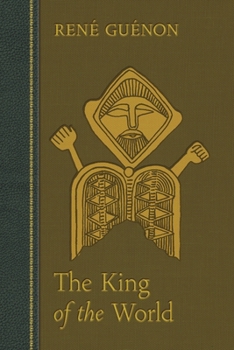The King of the World
(Part of the Spiritual Authority - Temporal Power Series)
Select Format
Select Condition 
Book Overview
Ren Gu non (1886-1951) was one of the great luminaries of the twentieth century, whose critique of the modern world has stood fast against the shifting sands of intellectual fashion. His extensive writings, now finally available in English, are a providential treasure-trove for the modern seeker: while pointing ceaselessly to the perennial wisdom found in past cultures ranging from the Shamanistic to the Indian and Chinese, the Hellenic and Judaic, the Christian and Islamic, and including also Alchemy, Hermeticism, and other esoteric currents, they direct the reader also to the deepest level of religious praxis, emphasizing the need for affiliation with a revealed tradition even while acknowledging the final identity of all spiritual paths as they approach the summit of spiritual realization.
This remarkable book grew out of a conference called by the chief editor of the prestigious journal Les Nouvelles Litt raires in 1924 to discuss Ferdinand Ossendowski's then recently published book Beasts, Men and Gods. The spokesmen called upon to lead the discussion were the well-known sinologist Ren Grousset, the neo-Thomist philosopher Jacques Maritain, and Ren Gu non, who was invited as an expert in Hinduism. Beasts, Men and Gods is a thrilling account of an escape through Central Asia, in which the author faces great hardships, meets and foils various enemies, comes into contact with shamans, and then with Mongolian lamas, whose marvels he describes. The book caused a great sensation, especially the closing chapters, in which Ossendowski recounts legends allegedly passed on to him concerning the "King of the World" and his subterranean kingdom of Agarttha. The present book, one of Gu non's most controversial, was written in response to this conference and develops the theme of the King of the World from the point of view of traditional metaphysics. Chapters include: Melki-Tsedeq; Luz: Abode of Immortality; The Supreme Center concealed during the Kali-Yuga; and Omphalos and Sacred Stones.





